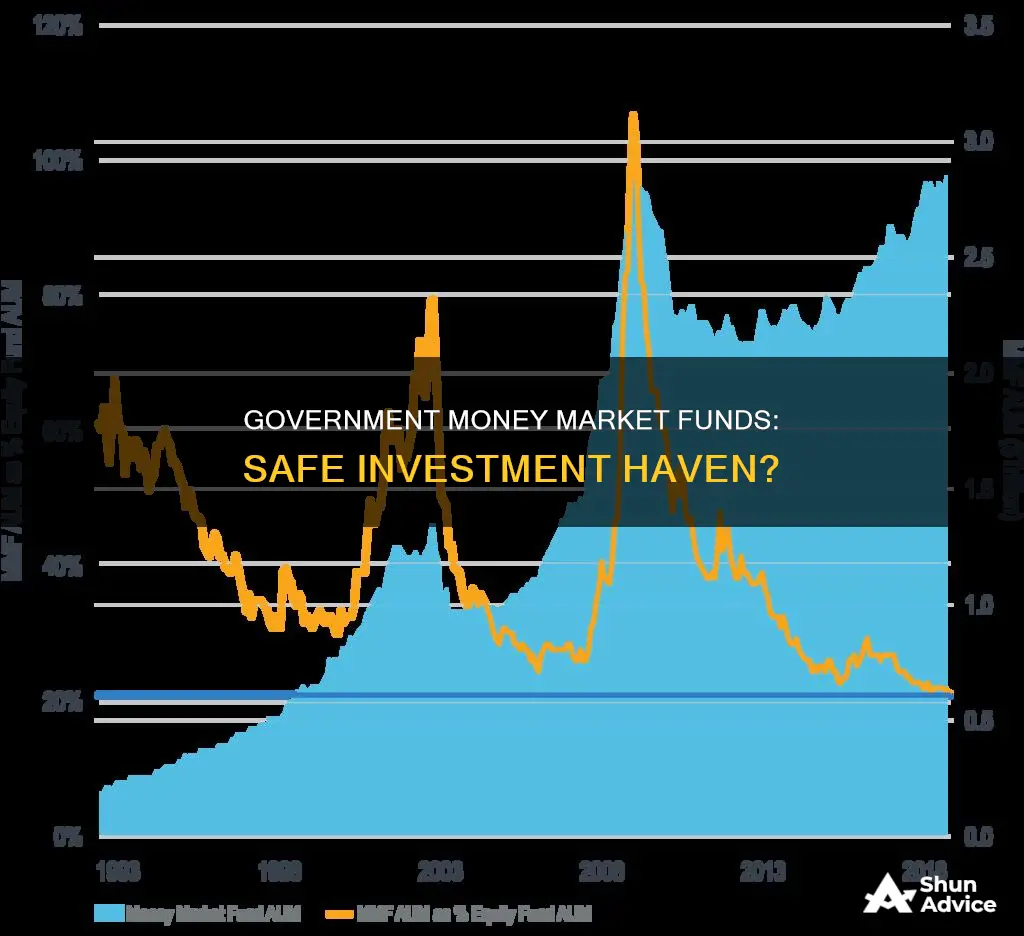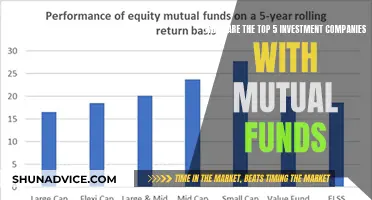
Money market funds are a type of mutual fund that invests in short-term, highly liquid, low-risk debt securities. They are considered extremely low-risk investments, ideal for short-term financial goals. Money market funds are not insured by the Federal Deposit Insurance Corporation (FDIC) but are required to comply with guidelines set by the Securities and Exchange Commission (SEC). While they offer stability and security, money market funds have low returns and are therefore not suitable for long-term investment goals.
| Characteristics | Values |
|---|---|
| Type of fund | Mutual fund |
| Risk level | Low |
| Returns | Low |
| Liquidity | High |
| Volatility | Low |
| Investment type | Short-term |
| Tax | Income is taxable or tax-exempt depending on the fund's portfolio |
| Suitable for | Short-term financial goals |
| Regulated by | Securities and Exchange Commission (SEC) |
| Insured by | Securities Investor Protection Corporation (SIPC) |
What You'll Learn

What are government money market funds?
A government money market fund is a type of mutual fund that invests in short-term, high-quality securities. These funds are designed to offer investors high liquidity with lower risk and the stability of capital, usually with higher yields than some other cash products.
Government money market funds invest in short-term US government debt securities, such as US Treasury obligations and repurchase agreements. They are required to invest at least 99.5% of their total assets in cash, government securities, and repurchase agreements that are fully collateralised by cash or government securities.
They are considered extremely low-risk investments and are suitable for investors who have a low tolerance for volatility or are looking to diversify with a more conservative investment strategy. Money market funds are also a good option for those who need their investments to be extremely liquid.
In the US, money market funds are regulated by the Securities and Exchange Commission (SEC) and protected by the Securities Investor Protection Corporation (SIPC). However, they are not insured by the Federal Deposit Insurance Corporation (FDIC).
Invest Wisely: High-Return Funds for Smart Investors
You may want to see also

How do they compare to money market accounts?
Money market funds and money market accounts (MMAs) are both low-risk ways to save money and earn modest returns. However, there are several differences between them.
Returns
Money market funds earn higher returns than money market accounts. Money market funds can deliver tax-free earnings, but they carry more risk. Money market accounts offer lower returns but are considered a safer investment option.
Accessibility
Money market accounts offer easier access to your money and don't require an investment account. Money market funds must be bought and sold like any mutual fund, so they may not provide as much daily access to your money as a money market account.
Fees
Money market accounts could charge maintenance fees if your account drops below a specified amount. Money market funds typically charge an expense ratio, which is a percentage-based amount for management fees.
Risk
Money market accounts are insured by the Federal Deposit Insurance Corporation (FDIC) or the National Credit Union Administration (NCUA). Money market funds are insured by the Securities Investor Protection Corporation (SIPC). Both account types are vulnerable to the risk of not keeping up with inflation, which can cause you to lose money.
Suitability
Money market accounts (MMAs) and money market funds (MMFs) are suitable if you're seeking short-term, stable, liquid places to save money. An MMA might be ideal for a saver who wants their funds to have FDIC or NCUA insurance and the simplicity of a savings account with potentially more interest. An MMF might be better for someone comfortable with a mutual fund's risks and rewards or someone in a higher tax bracket who wants tax-advantaged returns.
Hedge Funds: Why Investors Still Find Them Attractive
You may want to see also

Are government money market funds safe?
Money market funds are a type of mutual fund that invests in highly-liquid, short-term debt securities. They are considered extremely low-risk investments and are ideal for short-term financial goals.
Government money market funds are considered to be one of the safest types of money market funds. These funds invest at least 99.5% of their total assets in cash, government securities, and repurchase agreements that are fully collateralized by cash or government securities. Treasury Funds, which invest in standard US Treasury-issued debt securities, are also included in this category.
While money market funds are considered safe, they are not without risk. Here are some factors to consider when evaluating the safety of government money market funds:
- Credit Risk: Money market funds invest in high-quality securities, but there is still a risk of losing money. Unlike typical bank certificates of deposit (CDs) or savings accounts, money market funds are not insured by the Federal Deposit Insurance Corporation (FDIC).
- Inflation Risk: Due to the short-term and low-risk nature of the underlying investments, returns from money market funds may not keep up with inflation, leading to a loss of purchasing power.
- Interest Rate Risk: Money market funds are sensitive to interest rate fluctuations. When interest rates are low, returns from money market funds may be significantly lower.
- Liquidity Risk: Money market funds aim to provide high liquidity, but there may be limitations on the number of withdrawals allowed within a certain period. Additionally, some funds may impose liquidity fees upon the sale of shares.
- Default Risk: While US government securities are considered safe, certain issuers, such as "Government-Sponsored Enterprises" like Fannie Mae and Freddie Mac, are sponsored by Congress but are not issued or guaranteed by the US Treasury. This adds a negligible level of default risk.
In summary, government money market funds are considered safe due to their focus on highly liquid, short-term, low-risk investments, with a significant portion invested in US government securities. However, it is essential to understand the potential risks involved, such as credit, inflation, interest rate, liquidity, and default risks.
Best Vanguard Index Funds to Invest $1000 Minimum
You may want to see also

What are the pros and cons of investing in them?
Government money market funds are considered to be one of the safest investments. They are ideal for short-term saving as they invest in highly liquid securities with the objective of capital preservation and income. However, they are not suitable for long-term investment goals like retirement planning as they don't offer much capital appreciation.
Pros
- Stability: Money market funds are considered to be one of the least volatile types of mutual fund investments.
- Liquidity: Money market funds are highly liquid, and it's easy to retrieve funds.
- Security: Money market funds are required by SEC regulations to invest in short-maturity, low-risk investments, making them less prone to market fluctuations.
- Short duration: Money market funds have a short duration, usually a few months, making them less susceptible to interest rate risk.
- Diversification: Money market funds tend to hold many different securities, with limited exposure to any single issuer.
- Potential tax advantages: Some money market funds invest in securities whose interest payments are typically exempt from federal and, in some cases, state income taxes.
- Better returns than bank accounts: Money market funds may provide higher income potential than a bank savings account.
Cons
- Low returns: Money market funds have low returns compared to stocks and bonds, and there is little capital appreciation.
- Loss of purchasing power: If the rate of inflation is higher than the fund's return, investors are essentially losing purchasing power.
- Lack of FDIC insurance: Money market funds are not insured by the Federal Deposit Insurance Corporation (FDIC).
- Expenses: Annual fees can eat up a substantial chunk of the profit.
- Risk of higher yields: Fund managers may take on more risk to obtain higher yields.
Mutual Fund Investment: Key Factors to Consider
You may want to see also

How do I invest in a government money market fund?
Money market funds are a type of mutual fund that invests in highly liquid, short-term instruments. These instruments include cash equivalent securities, high-credit-rating debt-based securities with short-term maturity (such as U.S. Treasuries), and repurchase agreements that are collateralized by cash or government securities.
To invest in a government money market fund, you can purchase shares through investment fund companies, brokerage firms, or banks. These funds are regulated by the Securities and Exchange Commission (SEC) and are considered extremely low-risk investments.
- Understand the risks and benefits: Money market funds are considered low-risk and low-return investments. They are suitable for investors with short-term investment goals and a low tolerance for volatility. While they offer high liquidity and stability, they may not be ideal for long-term investment goals like retirement planning due to their low capital appreciation.
- Evaluate the fund: Consider factors such as the fund's maturity, credit quality, diversification, and liquidity requirements to ensure they align with your investment objectives and strategy.
- Choose the right type of fund: Government money market funds invest at least 99.5% of their total assets in cash, government securities, and repurchase agreements. They are considered one of the safest types of money market funds.
- Consider the fees: Money market funds typically have no entry or exit charges, but there may be other fees associated with the fund, such as liquidity fees or redemption fees.
- Select a fund provider: You can purchase shares of government money market funds through investment fund companies, brokerage firms, or banks. Compare different providers to find one that aligns with your investment goals and offers competitive fees.
- Purchase the fund shares: Contact your chosen provider to initiate the purchase of the fund shares. You may need to meet certain minimum investment requirements, depending on the fund and provider.
- Monitor your investment: Regularly review the performance of your investment and make adjustments as necessary. Remember that money market funds are sensitive to interest rate fluctuations, so keep an eye on changing market conditions.
By following these steps, you can invest in a government money market fund, taking advantage of its low-risk nature and potential for stable returns.
Liquid Fund Investment Strategies: Where to Invest?
You may want to see also
Frequently asked questions
Yes, government money market funds are considered one of the safest investments. They are ideal for short-term financial goals as they invest in highly liquid securities with the objective of capital preservation and income.
While government money market funds are considered safe, they are not insured by the Federal Deposit Insurance Corporation (FDIC). They are, however, required to comply with guidelines set by the Securities and Exchange Commission (SEC). There is also a risk of losing purchasing power as the low returns may not keep up with inflation.
Investing in a government money market fund is similar to investing in any other mutual fund. It may require a minimum investment and can generally be purchased through a brokerage or financial services firm or directly from the mutual fund company.







